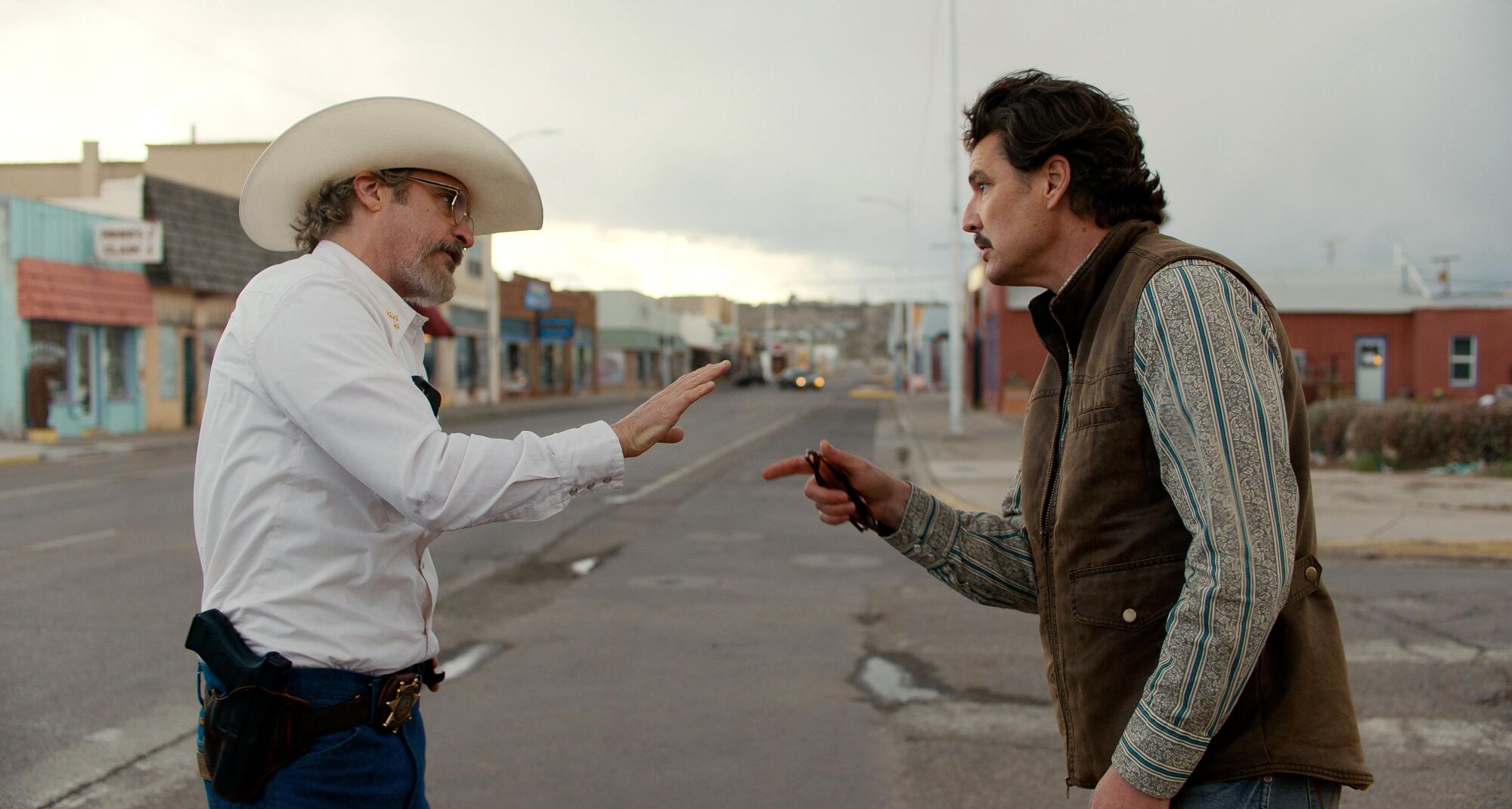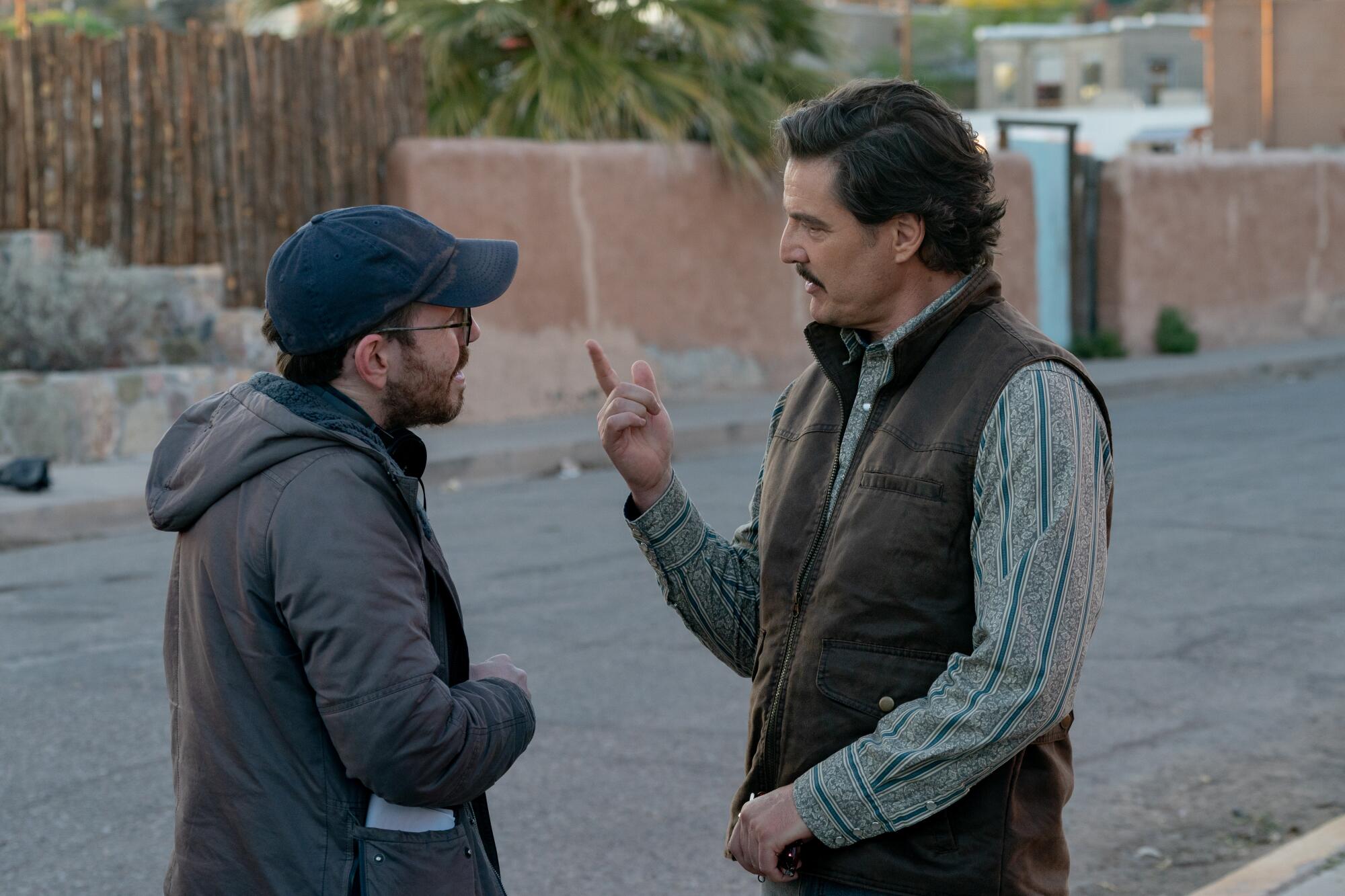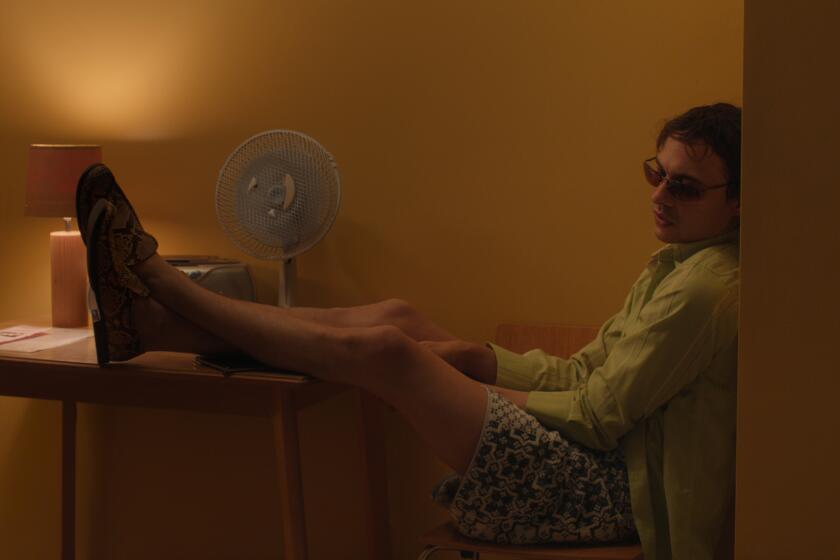
- Share via
CANNES, France — “The sun is my mortal enemy,” Ari Aster says, squinting as he sits on the sixth-floor rooftop terrace of Cannes’ Palais des Festivals, where most of the screenings happen. It’s an especially bright afternoon and we take refuge in the shade.
Aster, the 38-year-old filmmaker of “Hereditary” and “Midsommar,” wears an olive-colored suit and baseball cap. He’s already a household name among horror fans and A24’s discerning audiences, but the director is competing at Cannes for the first time with “Eddington,” a paranoid thriller set in a New Mexican town riven by pandemic anxieties. Like a modern-day western, the sheriff (Joaquin Phoenix) spars with the mayor (Pedro Pascal) in tense showdowns while protests over the murder of George Floyd flare on street corners. Too many people cough without their masks on. Conspiracy nuts, mysterious drones and jurisdictional tensions shift the film into something more Pynchonesque and surreal.
In advance of the movie’s July 18 release, “Eddington” has become a proper flash point at Cannes, dividing opinion starkly. Like Aster’s prior feature, 2023’s “Beau Is Afraid,” it continues his expansion into wider psychological territory, signaling a heretofore unexpressed political dimension spurred by recent events, as well as an impulse to explore a different kind of American fear. We sat down with him on Sunday to discuss the movie and its reception.
I remember what it was like in 2018 at Sundance with “Hereditary” and being a part of that first midnight audience where it felt like something special was happening. How does this time feel compared with that?
It feels the same. It’s just nerve-wracking and you feel totally vulnerable and exposed. But it’s exciting. It’s always been a dream to premiere a film in Cannes.
Have you ever been to Cannes before?
No.
So this must feel like living out that dream. How do you think it went on Friday?
I don’t know. How do you feel it went? [Laughs]
I knew you were going to turn it around.
That’s what everybody asks me. Everybody comes up saying [makes a pity face], “How are you feeling? How do you think it went?” And it’s like, I am the least objective person here. I made the film.
I know you’ve heard about those legendary Cannes premieres where audiences have extreme reactions and it feels like the debut of “The Rite of Spring.” Some people are loving it, some people are hating it. Those are the best ones, aren’t they?
Oh, yeah. But again, I don’t really have a picture of what the response is.
Do you read your reviews?
I’ve been staying away while I do press and talk to people. So I can speak to the film.
Makes sense. I felt great love in the room for Joaquin Phoenix, who was rubbing your shoulder during the ovation. Have you talked to the cast and how they think it went, or were they just having a good time?
I think that they’re all really proud of the film. That’s what I know and it’s been nice to be here with them.

In the context of your four features, “Hereditary,” “Midsommar,” “Beau Is Afraid” and now “Eddington,” how easy was “Eddington” to make?
They’re all hard. We’re always trying to stretch our resources as far as they can go, and so they’ve all been just about equally difficult, in different ways.
Is it fair to say that your films have changed since “Hereditary” and “Midsommar” and now they’re more accommodating of a larger swath of sociopolitical material?
I am just following my impulses so I’m not thinking in that way. There’s very little strategy going on. It’s just: What am I interested in? And when I started writing, because I was in a real state of fear and anxiety about what was happening in the country and what was happening in the world, and I wanted to make a film about what it was feeling like.
This was circa what, 2020?
It was in June 2020 that I started writing it. I wanted to make a film about what it feels like to live in a world where nobody agrees about what is happening.
You mean no one agrees what is happening in the sense that we can’t even agree on the facts?
Yes. There’s this social force that has been at the center of mass liberal democracies for a very long time, which is this agreed-upon version of what is real. And of course, we could all argue and have our own opinions, but we all fundamentally agreed about what we were arguing about. And that is something that has been going away. It’s been happening for the last 20-something years. But COVID, for me, felt like when the last link was cut, this old idea of democracy, that it could be sort of a countervailing force against power, tech, finance. That’s gone now completely.
And at that moment it felt like I was kind of in a panic about it. I’m sure that I am probably not alone. And so I wanted to make a film about the environment, not about me. The film is very much about the gulf between politics and policy. Politics is public relations. Policy is things that are actually happening. Real things are happening very quickly, moving very quickly.
I think of “Eddington” as very much a horror film. It’s the horror of free-floating political anxiety. That’s what’s scaring you right now. And we don’t have any kind of control over it.
We have no control and we feel totally powerless and we’re being led by people who do not believe in the future. So we’re living in an atmosphere of total despair.
On the Croisette, Ari Aster’s ‘Eddington’ with Joaquin Phoenix and Pedro Pascal and a strong directing debut by ‘Babygirl’ star Harris Dickinson grab attention.
During the lockdown, I was just sitting on my phone doom-scrolling. Is that what you were doing?
Of course. There was a lot of great energy behind the internet, this idea of: It’s going to bring people together, it’s going to connect them. But of course then finance got involved, as it always does, and whatever that was curdled and was put on another track. It used to be something we went to. You went to your computer at home, you would maybe go to your email. Everything took forever to load. And then with these phones, we began living in cyberspace, so we are living in the internet.
It’s owned us, it’s consumed us and we don’t see it. The really insidious thing about our culture and about this moment is that it’s scary and it’s dangerous and it’s catastrophic and it’s absurd and ridiculous and stupid and impossible to take seriously.
Did that “ridiculous and stupid” part lead you aesthetically to make something that was an extremely dark comedy? I think “Eddington” sometimes plays like a comedy.
Well, I mean there’s something farcical going on. I wanted to make a good western too, and westerns are about the country and the mythology of America and the romance of America. They’re very sentimental. I’m interested in the tension between the idealism of America and the reality of it.
You have your western elements in there, your Gunther’s Pistol Palace and a heavily armed endgame that often recalls “No Country for Old Men.”
You’ve got Joe, who’s a sheriff, who loves his wife and cares about his community. And he’s 50 years old, so he grew up with those ’90s action movies and, at the end, he gets to live through one.
Let’s step backward for a second about where you were and what you were doing around the time you started writing this. You were finishing up “Beau Is Afraid,” right? What was your life like then? You were freaking out and watching the news and starting to write a script. What was that process like for you?
I was in New Mexico at the time. I was living in New York in a tiny apartment, but then I had to come back to New Mexico. There was a COVID scare in my family and I wanted to be near family. I was there for a couple months and just wanted to make a film about what the world felt like, what the country felt like.
Were you worried about your own health and safety during that time?
Of course. I’m a hyper-neurotic Jew. I’m always worried about my health.
And also the breakdown of truth. What were the reactions when you first started sharing your script with the people who ended up in your cast? What was Joaquin’s reaction like?
I just remember that he really took to the character and loved Joe and wanted to play him, and that was exciting to me. I loved working with him on “Beau” and I gave him the script hoping that he would want to do it. They all responded really quickly and jumped on. There was just a general excitement and a feeling for the project. I had a friendship with Emily [Emma Stone, whom Aster calls by her birth name] already and now we’re all friends. I really love them as actors and as people. It was a pretty fluid, nice process.
Wes Anderson wrote ‘The Phoenician Scheme’ with the actor in mind. In advance of its Cannes debut, we caught up with Del Toro on the biggest role of his career.
I haven’t seen many significant movies expressly about the pandemic yet. Did it feel like you were breaking new ground?
I don’t think that way, but I was wanting to see some reflection on what was happening.
Even in the seven years since “Hereditary,” do you feel like the business has changed?
Yeah, it is changing. I mean, everything feels like it’s changing. I think about [Marshall] McLuhan and how we’re in a stage right now where we’re moving from one medium to another. The internet has been the prominent, prevailing, dominant medium, and that’s changed the landscape of everything, and we’re moving towards something new. We don’t know what’s coming with AI. It’s also why we’re so nostalgic now about film and 70mm presentations.
Do you ever feel like you got into this business at the last-possible minute?
Definitely. I feel very fortunate that I’m able to make the films I want to make and I feel lucky to have been able to make this film.
There’s a lot of room in “Eddington” for any kind of a viewer to find a mirror of themselves and also be challenged. It doesn’t preach to the converted. Was that an intent of yours?
[Long pause] Sorry, I’m just thinking. I’m just starting to talk about the film. I guess I’m trying to make a film about how we’re all actually in the same situation and how similar we are. Which may be hard to see and I’m not a sociologist. But it was important to me to make a film about the environment.
I was asked recently, Do you have any hope? And I think the answer to that is that I do have hope, but I don’t have confidence.
It’s easy to be cynical.
But I do see that if there is any hope, we have to reengage with each other. And for me, it was important to not judge any of these characters. I’m not judging them. I’m not trying to judge them.

I love that you have a partner in A24 that is basically letting you go where you need to go as an artist.
They’ve been very supportive. It’s great because I’ve been able to make these films without compromise.
Do you have an idea for your next one?
I’ve got a few ideas. I’m deciding between three.
You can’t give me a taste of anything?
Not yet, no. They’re all different genres and I’m trying to decide what’s right.
Let’s hope we survive to that point. How are you personally, apart from movies?
I’m very worried. I’m very worried and I am really sad about where things are. And otherwise there needs to be another idea. Something new has to happen.
You mean like a new political paradigm or something?
Yeah. The system we’re in is a response to the last system that failed. And the only answer, the only alternative I’m hearing is to go back to that old system. I’ll just say even just the idea of a collective is just a harder thing to imagine. How can that happen? How do we ever come together? Can there be any sort of countervailing force to power? I feel increasingly powerless and impotent. And despairing.
Ari, it’s a beautiful day. It’s hard to be completely cynical about the world when you’re at Cannes and it’s sunny. Even in just 24 hours, “Eddington” has become a conversation film, debated and discussed. Doesn’t it thrill you that you have one of those kind of movies?
That’s what this is supposed to be. And you want people to be talking about it and arguing about it. And I hope it is something that you have to wrestle with and think about.
More to Read
Only good movies
Get the Indie Focus newsletter, Mark Olsen's weekly guide to the world of cinema.
You may occasionally receive promotional content from the Los Angeles Times.











